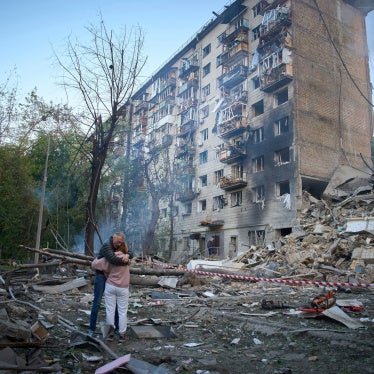Uzbekistan’s neighborhood committees violate fundamental human rights, carrying the government's repressive policies to the local level, Human Rights Watch said in a new report released today.
The 38-page report, "From House to House: Abuses by Mahalla Committees" documents the role neighborhood, or mahalla, committees have played in three critical areas of government abuse: the government's six-year campaign against so-called Islamic fundamentalists, its response to domestic violence, and the 2000-2001 forced resettlement in southern Uzbekistan.
For centuries, the mahalla was an autonomous institution organized around Islamic rituals and social events, but the current government transformed it into a national system for surveillance and control. Uzbekistan is divided up into approximately 12,000 mahallas, each containing between 150 and 1,500 households. The mahalla committees are local government authorities with the power to administer a range of activities.
"Mahalla committees may appear to be a benign form of local self-government, but in reality the government uses these committees to keep tight control over its population," said Rachel Denber, deputy director of Human Rights Watch's Europe and Central Asia Division. "Mahallas are the eyes and ears of the government, passing on all they observe to the police."
President Islam Karimov declared 2003 the “Year of the Mahalla,” reflecting the government’s intent to expand the powers of mahalla committees. By keeping files on those considered “overly pious” in their religious expression, carrying out surveillance, and reporting people’s “suspicious” religious activity to police, mahalla committees assist the government in its crackdown against peaceful, independent Muslims who practice Islam outside government-controlled religious institutions. They also organize and participate in public denunciations at which pious Muslims are abused, threatened and demonized.
Mahalla committees enforce government policy to prevent divorce at the expense of women’s rights to protection from domestic violence. Serving as a gatekeeper to law enforcement and the courts, mahalla committees frequently deny battered wives access to both, deny them permission to divorce, and hold women responsible for violence they face in the home. Human Rights Watch documented cases where mahalla committees coerced women to remain in abusive marriages that threatened women's safety and mental health.
Between August 2000 and March 2001, mahalla committees also participated in the Uzbek government's forced resettlement programs in southern Uzbekistan, following incursions by Islamic militants against the government. People were forced from their homes and relocated to resettlement villages where they were cut off from interaction with the general community and deprived of any means of livelihood. Mahalla committees joined the military and other authorities in the intimidating and violent tactics that characterized the forced displacement. They also sought to prevent people who were living in abysmal conditions in resettlement centers from meeting with independent human rights monitors.
Human Rights Watch called on the government to ensure that mahalla committees stop discrimination and surveillance of independent Muslims; provide in-depth training of mahalla officials on the provision of protection to complainants in domestic violence cases; and facilitate, rather than block, access for international organizations and the media to resettlement villages.
Human Rights Watch further called on international donors to require reform of mahalla committees as a condition for funding projects involving the committees.
"Donors need to be very careful before putting money into institutions like mahalla committees," said Denber. "Otherwise, they could end up supporting the very abuses that they are trying to help overcome."
Examples of abuses by mahalla committees:
- On June 5, Akhmadjon Madmarov, a human rights activist whose three sons were in prison for the expression of their Muslim faith, was asked to meet with a
procurator at the office of the mahalla committee in Margilan, in the Fergana Valley. When Madmarov arrived, he faced a “commission” made up of police, procurators, and mahalla committee members. The commission showed him an official warning letter, stating that if he participated in further protests, he would be charged with a crime. A procurator at the meeting demanded that he sign the letter. Madmarov refused, stating that he had not participated in any protests, but that he had observed a protest against the treatment of religious prisoners several days earlier in his capacity as a human rights defender. “The procurator told me to sign the warning letter. I refused and said that I haven’t breached anything. He said, ‘Okay, the commission will write in the minutes that you refused to sign.’ I asked for a copy of the letter. They refused to give it to me.” - “Lola L.” endured twenty-six years of violence in her marriage, which resulted in a punctured lung and a related chronic illness. She had turned to local mahalla committee leaders many times before making her latest appeal to a newly installed mahalla committee chairwoman. “We have a tradition that when you come with a complaint, two or three days go by and they promise to help, and then they start to persuade you to forgive him and to stay,” she recounted. “I came to the previous chairman three times, and after two or three days they start to persuade you to go back.”
- Mahalla committee members used the promise of compensation as a tactic to facilitate the arrest of displaced people suspected of collusion with Islamic insurgents in southern Uzbekistan. Arbob Sherkholov and Shakhizinda Rajabov, from Uzun district, were arrested from the Istiklol resettlement village. Oista Sherkholova, Sherkholov’s wife and Rajabov’s sister, told Human Rights Watch:
On December 13, 2000, at 4:00 p.m., a policeman and the chairman of the Sherobod mahalla arrived at our house in a police car. They said to Arbob and Shakhizinda, “we would like to give you land and compensation money, come to Sherobod for discussions now, then you can come home in three days.” …. I waited for fifteen days, then I went with twelve other women to Termez, and along with the other women I found my husband’s name on the list of prisoners in Termez prison.







